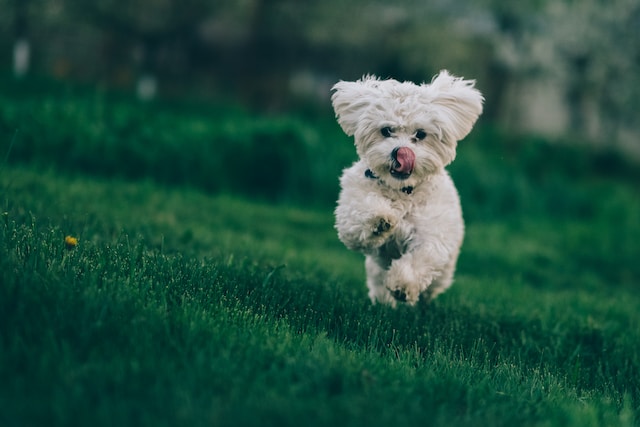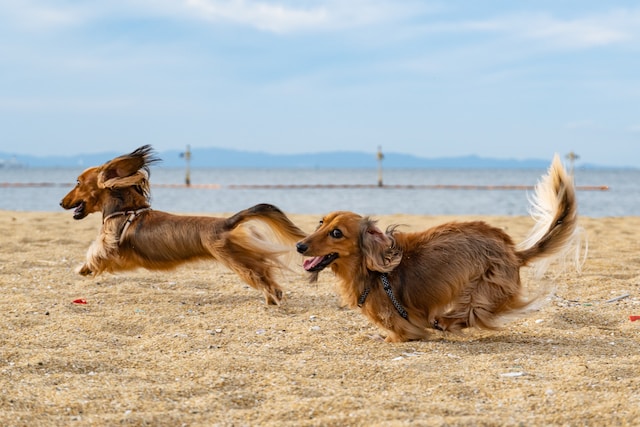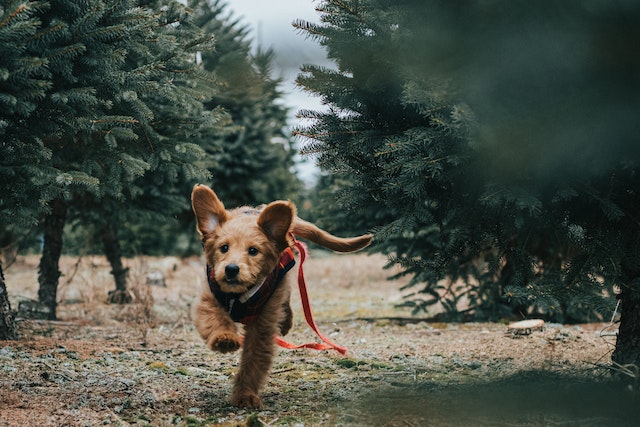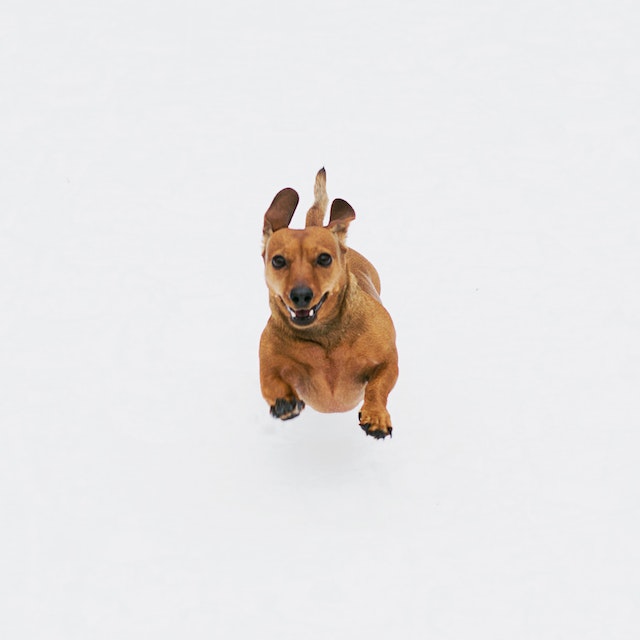Have you ever experienced the heart-wrenching moment when your furry companion dashes off, ignoring your calls and leaving you feeling bewildered and concerned? Many dog owners have faced the puzzling behavior of their dog running away from them, and it can be both frustrating and worrying. But why do dogs engage in this behavior? The answer is not always straightforward, as there could be multiple reasons behind it.
In this article, we will delve into the intriguing question of “Why Does My Dog Run Away from Me?” We will explore the various factors that may contribute to this behavior, ranging from instinctual drives to environmental and behavioral triggers. It’s important to understand that each dog is unique, and there is no one-size-fits-all explanation for why they may choose to run away from their owners.
As responsible pet owners, it’s crucial to gain insight into our furry friends’ behavior to address any potential concerns and provide them with the care they need. So, if you’ve ever wondered why your dog runs away from you, join us as we uncover the possible reasons behind this behavior and explore how to better understand and manage it. Let’s dive in and unlock the mystery of why dogs sometimes choose to dash off into the unknown.
Why does my dog run away from me?
Dogs running away from their owners can be caused by a variety of reasons. One possible explanation is rooted in a dog’s instinctual drive to explore and roam. Dogs are descendants of wolves, which were natural wanderers. This innate instinct may still be present in domesticated dogs, leading them to venture off in search of new sights, smells, or experiences.
Another factor that can cause dogs to run away is fear or anxiety. If a dog feels threatened or stressed, they may instinctively flee as a survival mechanism. For example, loud noises, unfamiliar environments, or even unintentional frightening experiences can trigger a dog’s flight response, causing them to run away from their owner in an attempt to escape the perceived threat.
Additionally, dogs may run away due to lack of proper training or socialization. Dogs that have not been adequately trained to come when called or those that have not been exposed to different environments and experiences may be more prone to running off when given the opportunity.
It’s also important to note that some dog breeds are more inclined to engage in running behaviors due to their genetic predisposition. Breeds such as hounds, terriers, and sled dogs have a strong prey drive or an inherent need to explore, which may increase the likelihood of them running away from their owner.
In conclusion, dogs may run away from their owners due to instinctual drives, fear or anxiety, lack of training or socialization, or breed predisposition. Understanding the potential reasons behind this behavior can help dog owners better manage and prevent it, ensuring the safety and well-being of their furry friends.
Why does my dog run away from me when I approach?

When a dog runs away from their owner as they approach, it can be attributed to various factors. One possible reason is that the dog is fearful or anxious about the approach. This may be due to a past negative experience or a lack of trust in the owner’s intentions. The dog may also feel threatened or overwhelmed by the approach, leading them to flee as a form of self-preservation.
Another possible explanation is that the dog is engaging in play or seeking attention. Some dogs enjoy a game of chase and may run away as an invitation for the owner to pursue them. This can be a playful behavior, but it’s important to ensure that it does not become a dangerous situation, such as the dog running into hazardous areas or getting lost.
Additionally, the dog’s temperament and personality traits can play a role. Some dogs are naturally more independent or aloof, and they may run away as a way to assert their independence or avoid being restrained. Breeds with a strong prey drive, such as hunting or herding breeds, may also have a higher tendency to run away when approached.
It’s essential to understand the underlying reasons for this behavior and address them accordingly. Patiently building trust, providing positive reinforcement for desired behaviors, and using appropriate training techniques can help prevent the dog from running away when approached, ensuring a safer and more enjoyable relationship between the dog and their owner.
Why does my dog run away from me when I call him?
When a dog runs away from their owner when called, it can be a concerning behavior that can have multiple explanations. One possible reason is that the dog lacks proper training and recall skills. If a dog has not been consistently trained to come when called or has had negative experiences associated with being called, they may not respond to their owner’s calls and instead run away.
Another possible explanation is that the dog is distracted or engaged in an enjoyable activity. Dogs have a keen sense of smell and hearing, and they may be drawn to interesting scents, sounds, or sights in their environment, making them reluctant to respond to their owner’s call.
Fear or anxiety can also play a role in this behavior. If a dog has had traumatic experiences or is generally fearful, they may associate being called with negative outcomes and may choose to run away to avoid perceived threats or stressors.
Additionally, individual personality traits and breed tendencies can influence a dog’s response to being called. Some dogs may have a more independent or stubborn nature, while certain breeds with a high prey drive or natural wanderlust may be more prone to running away when called.
To address this behavior, consistent recall training using positive reinforcement methods, building a strong bond of trust and positive association, and addressing any underlying fear or anxiety issues can be helpful.
Ensuring a safe and controlled environment for off-leash activities and providing appropriate mental and physical stimulation can also reduce the dog’s desire to run away when called. Consulting with a professional dog trainer or behaviorist may be beneficial for more challenging cases.
Why does my dog run away from me in the house?
A dog runs away from their owner within the confines of the house, it can be puzzling and concerning behavior. There could be several reasons why a dog exhibits this behavior. One possible explanation is that the dog is engaging in play or seeking attention. Running away from the owner may be part of a game or a playful behavior that the dog finds enjoyable.
Another reason could be fear or anxiety. If a dog has had negative experiences or lacks confidence in certain areas of the house, they may instinctively run away to avoid perceived threats or discomfort.
It’s also possible that the dog is seeking privacy or solitude. Dogs, like humans, have their own preferences for personal space, and running away from the owner in the house could be their way of finding a quiet spot or avoiding unwanted interactions.
there is also, medical issues such as pain or discomfort could be a factor. If a dog is experiencing physical discomfort, they may try to avoid being touched or approached by running away from the owner.
To address this behavior, it’s important to identify any potential underlying causes and address them accordingly. Providing positive reinforcement for desired behaviors, creating a positive and enriching environment within the house, and gradually desensitizing the dog to any fearful areas can be helpful. Consulting with a veterinarian or a professional dog behaviorist may also be beneficial in determining and addressing the root cause of the behavior.
Why does my dog run away from me scared?

If your dog runs away from you in a scared manner, it can be distressing and concerning for both the dog and the owner. There are several potential reasons why a dog may exhibit this behavior:
- Past trauma or negative experiences: If a dog has experienced trauma or negative interactions in the past, they may develop fear or anxiety towards their owner or other humans. This can cause them to run away in an attempt to escape perceived threats.
- Lack of socialization: Dogs that have not been properly socialized to different environments, people, or experiences during their critical developmental period may be more prone to fear and anxiety. Running away could be their instinctual response to perceived danger or discomfort.
- Genetic predisposition: Some dogs may have a genetic predisposition towards anxiety or fearfulness, which can manifest as running away when approached by their owner or other people.
- Mistreatment or harsh handling: Dogs that have been mistreated, yelled at, or subjected to harsh handling may develop fear towards their owner or other humans, leading them to run away in an attempt to avoid further negative interactions.
- Medical issues: Dogs in pain or discomfort may exhibit fearful behavior, including running away from their owner, as a way to protect themselves or avoid exacerbating their discomfort.
It’s crucial to approach a scared dog with patience, understanding, and positive reinforcement techniques. Forcing or chasing a scared dog can exacerbate their fear and make the behavior worse.
Consulting with a veterinarian or a professional dog behaviorist can help in identifying the underlying cause and developing a tailored behavior modification plan to help the dog feel more secure and confident.
Why does my dog run away from me when he has something in his mouth?
When a dog runs away from their owner while holding something in their mouth, it may be due to a variety of reasons:
- Resource guarding: Dogs have a natural instinct to protect their possessions, including food, toys, or other items they consider valuable. If a dog is running away from their owner with an item in their mouth, it could be a form of resource guarding, where the dog is trying to keep the item for themselves and prevent it from being taken away.
- Play behavior: Some dogs may engage in playful behavior by running away with an item in their mouth, enticing their owner to chase them. This can be a playful game for the dog, and they may enjoy the attention and interaction that comes from running away with an object.
- Fear or anxiety: In some cases, a dog may feel anxious or fearful when approached by their owner while holding an object in their mouth. They may be concerned that the object will be taken away, and running away can be their way of protecting it.
- Lack of trust or discomfort: If a dog lacks trust in their owner or is uncomfortable with them being close while they have an object in their mouth, they may choose to run away to avoid potential confrontation or perceived threat.
- Habitual behavior: Some dogs may have developed a habit of running away with objects in their mouth due to previous positive experiences or reinforcement for the behavior.
It’s important to understand why a dog is running away with an object in their mouth and address any underlying issues accordingly. This may include training and behavior modification techniques to address resource guarding, building trust and positive associations, and providing appropriate outlets for play and interaction.
Consulting with a veterinarian or a professional dog behaviorist can provide valuable guidance in managing and modifying this behavior.
Why does my dog run away from me when I try to pick him up?
When a dog runs away from their owner when attempting to pick them up, it could be due to a variety of reasons:
- Fear or discomfort: Some dogs may feel anxious, scared, or uncomfortable when picked up, especially if they have had negative experiences in the past or if they have not been properly acclimated to being handled. They may run away to avoid the perceived threat or discomfort.
- Past negative associations: If a dog has had previous negative experiences when being picked up, such as being dropped or mishandled, they may develop fear or avoidance behavior as a result. They may associate being picked up with those negative experiences and try to escape when approached.
- Physical discomfort or pain: Dogs with physical discomfort or pain, such as joint issues, injuries, or soreness, may run away when approached for picking up as a way to protect themselves from further discomfort or pain.
- Lack of trust or bonding: If a dog does not have a strong bond or trust with their owner, they may feel uneasy or frightened when approached for picking up. Building trust through positive reinforcement and gentle handling can help address this issue.
- Personal preference or individual temperament: Some dogs simply may not enjoy being picked up and prefer to keep their feet on the ground. It may be their individual temperament or preference, and they may run away to avoid being picked up.
Understanding the underlying reason why a dog runs away when being picked up is crucial in addressing the behavior. Patient and positive reinforcement-based training, acclimating the dog to being handled gradually, addressing any physical discomfort, and building a strong bond of trust with the dog can help modify this behavior over time.
Consulting with a veterinarian or a professional dog behaviorist can provide further guidance and assistance in managing and modifying this behavior.
Why does my dog run away from me off-leash?

When a dog runs away from their owner when off-leash, it can be concerning and potentially dangerous. Several reasons could contribute to this behavior:
- Lack of recall training: If a dog has not been properly trained to come when called, they may not understand or respond to verbal cues to return to their owner. This can result in the dog running away to explore or engage in other activities, ignoring the owner’s attempts to call them back.
- High prey drive or instinctual behavior: Dogs with a high prey drive or strong instinctual behaviors, such as chasing after squirrels or other animals, may run off when off-leash to pursue their natural instincts. This can override their response to recall commands, making it difficult for the owner to regain control.
- Lack of boundaries or training: Dogs that have not been consistently trained on basic obedience commands or off-leash manners may not understand the expectations when off-leash. This can result in the dog running away, as they do not understand the boundaries or limitations in place.
- Fear or anxiety: Some dogs may feel anxious or scared when off-leash in unfamiliar environments, leading them to run away in an attempt to escape the perceived threat. This can be due to past traumatic experiences, lack of socialization, or general anxiety.
- Strong desire for exploration or freedom: Dogs that are curious and have a strong desire for exploration or freedom may run away when off-leash to satisfy their curiosity or desire to explore their surroundings.
To address this behavior, it is important to prioritize recall training and ensure that the dog has a solid understanding of recall commands in a controlled environment before allowing them off-leash in unfamiliar or unsecured areas.
Consistent and positive reinforcement-based training, providing appropriate outlets for natural instincts, setting clear boundaries, and addressing any fear or anxiety through desensitization and counter-conditioning techniques can also be helpful.
Why is my dog running away from me all of a sudden?
If your dog is suddenly running away from you, it can be concerning and may indicate an underlying issue. There are several possible reasons for this sudden change in behavior:
- Fear or anxiety: Dogs can develop sudden fear or anxiety due to various reasons such as past traumatic experiences, changes in their environment, or unfamiliar situations. This fear or anxiety can trigger a flight response, causing the dog to run away from perceived threats, including their owner.
- Medical issues: Dogs in pain or discomfort may also exhibit sudden changes in behavior, including running away from their owner. If your dog is experiencing any physical discomfort or pain, it may cause them to avoid contact or interaction, including running away.
- Lack of trust or bonding: Dogs, especially rescue or newly adopted dogs, may not have developed a strong bond or trust with their owner. This lack of trust can cause them to be fearful or avoidant, leading to running away when approached.
- Change in routine or environment: Changes in the dog’s routine or environment, such as moving to a new home, changes in family dynamics, or disruptions in their daily routine, can cause stress or anxiety in dogs, leading to sudden behavior changes, including running away.
- Lack of recall training: If your dog has not been consistently trained on recall commands or off-leash manners, they may not understand or respond to verbal cues to come when called, resulting in running away.
To address this sudden change in behavior, it is important to identify and address any underlying causes. This may include providing a safe and comfortable environment for your dog, building trust and bonding through positive reinforcement-based training and interactions, addressing any medical issues with the help of a veterinarian, and ensuring that your dog has solid recall training to respond to commands.
Why is my dog running away from me and hiding?
If your dog is running away from you and hiding, it can be indicative of fear or anxiety. Dogs may exhibit such behavior for various reasons:
- Fear of punishment: If your dog has experienced punishment or negative consequences in the past for certain behaviors, they may associate you with those negative experiences and may run away and hide out of fear of further punishment.
- Fear of unfamiliar situations or changes: Dogs can be sensitive to changes in their environment or routine. If there are new people, objects, or changes in their surroundings, your dog may feel anxious or fearful, leading them to run away and hide.
- Lack of socialization: Dogs that have not been adequately socialized may not be comfortable with new people or unfamiliar situations. They may feel anxious or scared, leading them to run away and hide.
- Medical issues: Pain or discomfort due to an injury or illness can also cause dogs to run away and hide. They may be trying to protect themselves or alleviate discomfort by finding a secluded spot.
- Past traumatic experiences: Dogs that have experienced traumatic events in the past, such as abuse or neglect, may have a heightened fear response and may be more prone to running away and hiding as a coping mechanism.
It is important to approach your dog with patience and understanding if they are running away and hiding. Avoid using punishment or force, as it can exacerbate their fear and anxiety. Instead, provide positive reinforcement, create a safe and comfortable environment, and gradually expose your dog to new experiences and people through proper socialization techniques.
If your dog’s behavior persists or worsens, consulting with a qualified veterinarian or professional dog behaviorist may be helpful in addressing the underlying causes and developing a tailored plan to help your dog feel more secure and confident.
Why is my dog run away from me on walks?
If your dog runs away from you during walks, it can be concerning and frustrating. Several reasons could explain this behavior.
Fear or anxiety may be a contributing factor. Dogs that are fearful or anxious may try to escape from perceived threats, including you, during walks. This could be due to past traumatic experiences, lack of socialization, or fear of other people, animals, or objects in the environment.
Another possibility is a lack of training or impulse control. Dogs that have not been properly trained or lack impulse control may exhibit running away behavior during walks. This could be due to a lack of understanding of basic commands, such as recall or leash manners, or an inability to control their impulses to chase or explore.
Excess energy or overstimulation could also be a factor. Dogs that have high energy levels or become overly stimulated during walks may exhibit running away behavior as an outlet for their excess energy or excitement.
Additionally, certain triggers or environmental factors during walks, such as loud noises, sudden movements, or other dogs, could startle or intimidate your dog, causing them to run away.
It’s important to identify the underlying cause of your dog’s behavior and address it accordingly. This may involve proper training and reinforcement of basic commands, gradual desensitization and counter-conditioning to triggers, providing outlets for excess energy through exercise and mental stimulation, and building trust and positive associations during walks.
How to catch a dog that runs away from you?

Catching a dog that runs away from you can be challenging, but here are some tips that may help:
- Stay calm and avoid chasing: If your dog runs away from you, it’s important to stay calm and resist the urge to chase after them. Chasing can trigger a dog’s prey drive and encourage them to keep running away. Instead, stop and call your dog in a calm and soothing voice, using their name or a recall command.
- Use positive reinforcement: When your dog comes back to you, reward them with treats, praise, and affection. Positive reinforcement can help reinforce the behavior of returning to you, making it more likely for your dog to come back in the future.
- Use familiar cues or commands: If your dog has been trained with specific cues or commands, such as “sit” or “stay,” use them to gain their attention and redirect their focus towards you.
- Offer enticing rewards: Use a high-value treat or toy that your dog loves to lure them back to you. You can toss the treat or toy towards you or use it as a reward for coming closer.
- Create a safe and confined space: If your dog keeps running away from you in an open area, try to lure them into a confined space, such as a fenced yard or an enclosed area, where they are less likely to run off.
- Avoid punishment or negative reinforcement: Punishing or scolding your dog for running away from you can create fear or anxiety and may worsen their behavior. Instead, focus on positive reinforcement and rewarding desired behaviors.
- Consider professional help: If your dog’s running away behavior persists or is a safety concern, consider seeking help from a professional dog trainer or behaviorist who can provide specialized guidance and training techniques to address the issue.
Remember, patience, consistency, and positive reinforcement are key when trying to catch a dog that runs away from you. It’s important to understand the underlying reasons for your dog’s behavior and work towards building a strong bond and positive association with you through training, rewards, and reinforcement.
Final thoughts
In conclusion, understanding why your dog runs away from you is essential in addressing and managing this behavior. There can be various reasons for dogs to run away, such as fear, anxiety, lack of training, or natural instincts. It’s crucial to approach the situation with patience, consistency, and positive reinforcement to encourage your dog to come back to you willingly.
By building a strong bond and trust with your dog through training, rewards, and positive reinforcement, you can work towards resolving this behavior. Avoid punishment or negative reinforcement, as it can exacerbate the problem and create fear or anxiety in your dog.
If you’re struggling to catch a dog that runs away from you, consider seeking professional help from a qualified dog trainer or behaviorist. They can provide specialized guidance and techniques to address the issue effectively and safely.
Remember, it’s important to prioritize the safety and well-being of your dog at all times. Be proactive in addressing any underlying issues and creating a positive and trusting relationship with your furry friend. With patience, consistency, and positive reinforcement, you can help your dog overcome their tendency to run away from you and enjoy a closer, more bonded relationship with them.







